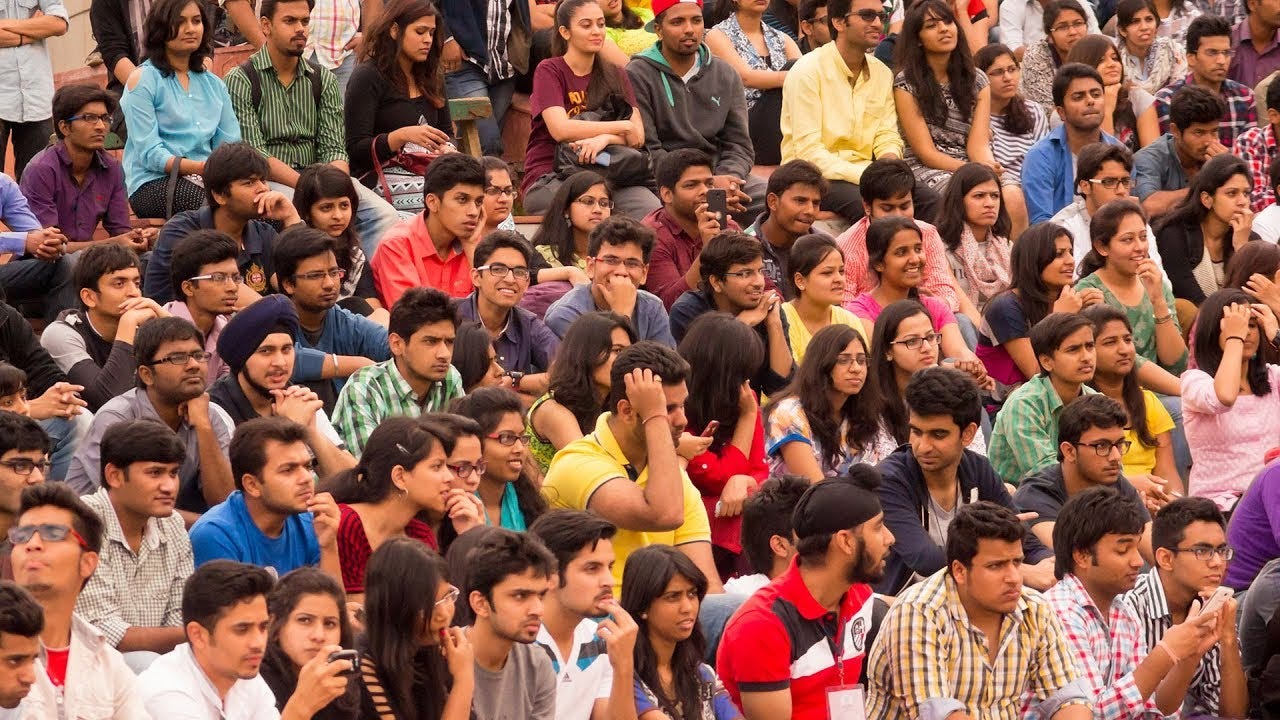Converting India’s Demographic Dividend to its Democratic Dividend
The onus of keeping young people engaged and vested in the democratic process is on us
Published in the Indian Express
Also read Young India Needs Sense of Purpose, Not SOPs
As part of my work, I meet with young people, mostly students, across India. Four common themes have emerged from these interactions, which require a response if we want to keep Young India (50% of the population is under 25 years old) vested in the democratic political process.
First, outside of elite and well-networked micro-set of young people, the vast majority feel they are not taken seriously, nor their problems prioritized. It's not just the perception that their opinion doesn't matter in the larger scheme of things but even that decisions for them are made without including them in decision-making. This is the underlying sentiment when a young person says, "who talks to us" or another states as matter of fact, “we are told what to do”. This is a genuine complaint. Young people are talked at but rarely listened to. And this is reflected in our public discourse. Other than the burning question of employment, problems of young people are by and large not prioritized. India is seeing the largest number of young people on the move for education and employment, and accommodation is an overriding preoccupation. Yet hostels for students and youth are not part of the mainstream discourse. Similarly, our public discourse on education is geared towards experts not students, riddled as it is with abstractions about budget, institutional autonomy etc which many young people don’t understand or relate to.
Second, there is a pervasive sense of lack of fair play: most young people will say some version of, “the “system” is corrupt”. It’s not just that opportunities are scarce but there is an acute sense that even access to these meagre opportunities is being skimmed from the top by influence instead of merit. The definition and question of “merit” is irrelevant, as is whether they would reasonably qualify if that definition were fairly applied - what is notable is that there is a deep sense of injustice and resentment. This is also perhaps why young people take so readily to “anti-corruption” mobilisations irrespective of ideology or actual effectiveness – for the satisfaction of potentially upending the existing power balance, which excludes them.
Third, there is palpable aspiration but overwhelming lack of direction. Large numbers of students are first-generation students, who are going to college for the first time in their family. This group has no built-in information networks and their understanding of possible pathways is very constrained. Ask a young person what s/he will do if their original plan doesn’t work and there isn’t really a response. More often than not, there is a demotivating lack of overlap between their aspiration and what they are doing. When asked, who do they turn to for advice, rarely do young people mention anyone who can fill in as an informed mentor. This is worrying not only because of the missed opportunities but equally for the lack of constructive authority structures to keep young people grounded.
Finally, there is a touching search for identity and self-pride, which makes young people particularly susceptible to being used opportunistically for commerce and malevolence. The young person posting selfies is trying to stand out. The young thug too is looking to assert some sense of self. They are also just passing time. It is our collective failure that we haven't shown accessible pathways to a progressive sense of identity, that instead of instilling a sense of self-pride, we have left most with a sense of being pushed around.
What is the consequence of our most dominant – in sheer numbers and energy – group feeling this way? Unfortunately, while there is real and legitimate emphasis on the need to mainstream Indian youth economically (jobs), there isn't adequate focus on mainstreaming young people politically - keeping them involved and vested in the democratic process. This is crucial because the resultant disaffection is likely to erupt (and already has) in violence in a country as overwhelmingly young as India.
Some urgent response is required from the powers that be, not merely out of a sense of responsibility but tactically if one is concerned about peace and progress in our country. There is the somewhat paradoxical situation where young people seem uninterested in politics but turned out in huge numbers to vote for Modi in 2014. But it's not that young people are not interested in politics, the political class is not talking about the things which interest them. Consequently, they are coalescing around the most bombastic personality with the hope that he will “do something”. In fact, this is the most often cited reason for supporting Modi by young people, “kuch to kar raha hai” (at least he is doing something). And the Prime Minister gets away with it because most young people are incredibly uninformed, relying on perception instead of facts to make their decisions. Almost no one is able to accurately explain any policy initiative launched by Modi but they will cite his political rhetoric and theatre as reason for support.
The onus of keeping young people engaged and vested in the democratic process is on us. We must speak directly on issues which matter to them in a language they understand. Some of these issues may seem mundane but they reflect the lived reality of the vast majority of young people. Bringing them front and centre in our public discourse and national politics is the only way to make youth feel that they are seen/heard and are cared for. Only then can we convert our demographic dividend into our democratic dividend.

